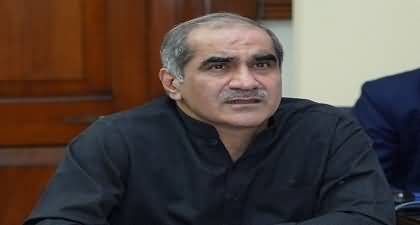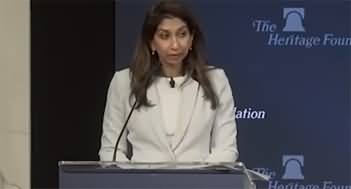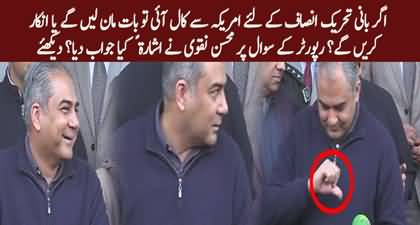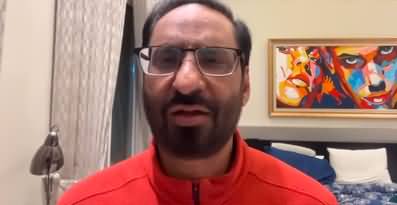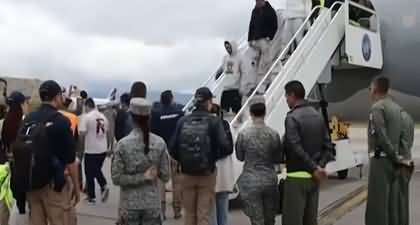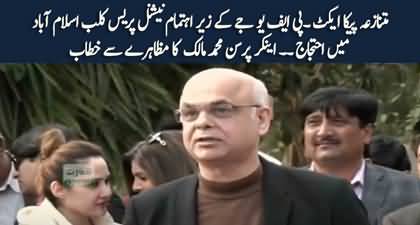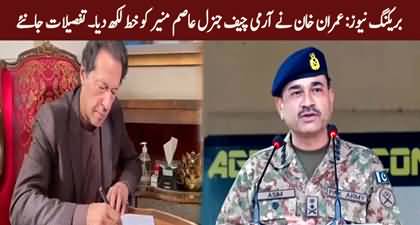Breaking: US newspaper Leaked the cypher that was sent to remove Imran Khan
بریکنگ نیوز۔ امریکی آن لائن ادارے انٹرسیپٹ نے عمران خان کو حکومت سے ہٹانے کیلئے بھیجا گیا مبینہ سائفر پبلک کردیا۔ انٹرسیپٹ کا آرٹیکل بمع سائفر کی تحریر کے ملاحظہ کیجئے۔
SECRET PAKISTAN CABLE DOCUMENTS U.S. PRESSURE TO REMOVE IMRAN KHAN
“All will be forgiven,” said a U.S. diplomat, if the no-confidence vote against Pakistan Prime Minister Imran Khan succeeds.
THE U.S. STATE DEPARTMENT encouraged the Pakistani government in a March 7, 2022, meeting to remove Imran Khan as prime minister over his neutrality on the Russian invasion of Ukraine, according to a classified Pakistani government document obtained by The Intercept.
The meeting, between the Pakistani ambassador to the United States and two State Department officials, has been the subject of intense scrutiny, controversy, and speculation in Pakistan over the past year and a half, as supporters of Khan and his military and civilian opponents jockeyed for power. The political struggle escalated on August 5 when Khan was sentenced to three years in prison on corruption charges and taken into custody for the second time since his ouster. Khan’s defenders dismiss the charges as baseless. The sentence also blocks Khan, Pakistan’s most popular politician, from contesting elections expected in Pakistan later this year.
One month after the meeting with U.S. officials documented in the leaked Pakistani government document, a no-confidence vote was held in Parliament, leading to Khan’s removal from power. The vote is believed to have been organized with the backing of Pakistan’s powerful military. Since that time, Khan and his supporters have been engaged in a struggle with the military and its civilian allies, whom Khan claims engineered his removal from power at the request of the U.S.
The text of the Pakistani cable, produced from the meeting by the ambassador and transmitted to Pakistan, has not previously been published. The cable, known internally as a “cypher,” reveals both the carrots and the sticks that the State Department deployed in its push against Khan, promising warmer relations if Khan was removed, and isolation if he was not.
March 7, 2022 Pakistani Diplomatic Cypher (Transcription)
The Intercept is publishing the body of the cable below, correcting minor typos in the text because such details can be used to watermark documents and track their dissemination. The Intercept has removed classification markings and numerical elements that could be used for tracking purposes. Labeled “Secret,” the cable includes an account of the meeting between State Department officials, including Assistant Secretary of State for the Bureau of South and Central Asian Affairs Donald Lu, and Asad Majeed Khan, who at the time was Pakistan’s ambassador to the U.S.
مبینہ سائفر کی مکمل تحریر ملاحظہ کیجئے
I had a luncheon meeting today with Assistant Secretary of State for South and Central Asia, Donald Lu. He was accompanied by Deputy Assistant Secretary of State Les Viguerie. DCM, DA and Counsellor Qasim joined me.
At the outset, Don referred to Pakistan’s position on the Ukraine crisis and said that “people here and in Europe are quite concerned about why Pakistan is taking such an aggressively neutral position (on Ukraine), if such a position is even possible. It does not seem such a neutral stand to us.” He shared that in his discussions with the NSC, “it seems quite clear that this is the Prime Minister’s policy.” He continued that he was of the view that this was “tied to the current political dramas in Islamabad that he (Prime Minister) needs and is trying to show a public face.” I replied that this was not a correct reading of the situation as Pakistan’s position on Ukraine was a result of intense interagency consultations. Pakistan had never resorted to conducting diplomacy in public sphere. The Prime Minister’s remarks during a political rally were in reaction to the public letter by European Ambassadors in Islamabad which was against diplomatic etiquette and protocol. Any political leader, whether in Pakistan or the U.S., would be constrained to give a public reply in such a situation.
I asked Don if the reason for a strong U.S. reaction was Pakistan’s abstention in the voting in the UNGA. He categorically replied in the negative and said that it was due to the Prime Minister’s visit to Moscow. He said that “I think if the no-confidence vote against the Prime Minister succeeds, all will be forgiven in Washington because the Russia visit is being looked at as a decision by the Prime Minister. Otherwise, I think it will be tough going ahead.” He paused and then said “I cannot tell how this will be seen by Europe but I suspect their reaction will be similar.” He then said that “honestly I think isolation of the Prime Minister will become very strong from Europe and the United States.” Don further commented that it seemed that the Prime Minister’s visit to Moscow was planned during the Beijing Olympics and there was an attempt by the Prime Minister to meet Putin which was not successful and then this idea was hatched that he would go to Moscow.
I told Don that this was a completely misinformed and wrong perception. The visit to Moscow had been in the works for at least few years and was the result of a deliberative institutional process. I stressed that when the Prime Minister was flying to Moscow, Russian invasion of Ukraine had not started and there was still hope for a peaceful resolution. I also pointed out that leaders of European countries were also traveling to Moscow around the same time. Don interjected that “those visits were specifically for seeking resolution of the Ukraine standoff while the Prime Minister’s visit was for bilateral economic reasons.” I drew his attention to the fact that the Prime Minister clearly regretted the situation while being in Moscow and had hoped for diplomacy to work. The Prime Minister’s visit, I stressed, was purely in the bilateral context and should not be seen either as a condonation or endorsement of Russia’s action against Ukraine. I said that our position is dictated by our desire to keep the channels of communication with all sides open. Our subsequent statements at the UN and by our Spokesperson spelled that out clearly, while reaffirming our commitment to the principle of UN Charter, non-use or threat of use of force, sovereignty and territorial integrity of States, and pacific settlement of disputes.
I also told Don that Pakistan was worried of how the Ukraine crisis would play out in the context of Afghanistan. We had paid a very high price due to the long-term impact of this conflict. Our priority was to have peace and stability in Afghanistan, for which it was imperative to have cooperation and coordination with all major powers, including Russia. From this perspective as well, keeping the channels of communication open was essential. This factor was also dictating our position on the Ukraine crisis. On my reference to the upcoming Extended Troika meeting in Beijing, Don replied that there were still ongoing discussions in Washington on whether the U.S. should attend the Extended Troika meeting or the upcoming Antalya meeting on Afghanistan with Russian representatives in attendance, as the U.S. focus right now was to discuss only Ukraine with Russia. I replied that this was exactly what we were afraid of. We did not want the Ukraine crisis to divert focus away from Afghanistan. Don did not comment.
I told Don that just like him, I would also convey our perspective in a forthright manner. I said that over the past one year, we had been consistently sensing reluctance on the part of the U.S. leadership to engage with our leadership. This reluctance had created a perception in Pakistan that we were being ignored and even taken for granted. There was also a feeling that while the U.S. expected Pakistan’s support on all issues that were important to the U.S., it did not reciprocate and we do not see much U.S. support on issues of concern for Pakistan, particularly on Kashmir. I said that it was extremely important to have functioning channels of communication at the highest level to remove such perception. I also said that we were surprised that if our position on the Ukraine crisis was so important for the U.S., why the U.S. had not engaged with us at the top leadership level prior to the Moscow visit and even when the UN was scheduled to vote. (The State Department had raised it at the DCM level.) Pakistan valued continued high-level engagement and for this reason the Foreign Minister sought to speak with Secretary Blinken to personally explain Pakistan’s position and perspective on the Ukraine crisis. The call has not materialized yet. Don replied that the thinking in Washington was that given the current political turmoil in Pakistan, this was not the right time for such engagement and it could wait till the political situation in Pakistan settled down.
I reiterated our position that countries should not be made to choose sides in a complex situation like the Ukraine crisis and stressed the need for having active bilateral communications at the political leadership level. Don replied that “you have conveyed your position clearly and I will take it back to my leadership.”
I also told Don that we had seen his defence of the Indian position on the Ukraine crisis during the recently held Senate Sub-Committee hearing on U.S.-India relations. It seemed that the U.S. was applying different criteria for India and Pakistan. Don responded that the U.S. lawmakers’ strong feelings about India’s abstentions in the UNSC and UNGA came out clearly during the hearing. I said that from the hearing, it appeared that the U.S. expected more from India than Pakistan, yet it appeared to be more concerned about Pakistan’s position. Don was evasive and responded that Washington looked at the U.S.-India relationship very much through the lens of what was happening in China. He added that while India had a close relationship with Moscow, “I think we will actually see a change in India’s policy once all Indian students are out of Ukraine.”
I expressed the hope that the issue of the Prime Minister’s visit to Russia will not impact our bilateral ties. Don replied that “I would argue that it has already created a dent in the relationship from our perspective. Let us wait for a few days to see whether the political situation changes, which would mean that we would not have a big disagreement about this issue and the dent would go away very quickly. Otherwise, we will have to confront this issue head on and decide how to manage it.”
We also discussed Afghanistan and other issues pertaining to bilateral ties. A separate communication follows on that part of our conversation.
Assessment
Don could not have conveyed such a strong demarche without the express approval of the White House, to which he referred repeatedly. Clearly, Don spoke out of turn on Pakistan’s internal political process. We need to seriously reflect on this and consider making an appropriate demarche to the U.S. Cd’ A a.i in Islamabad.
مندرجہ بالا سائفر کا اردو ترجمہ ملاحظہ کیجئے۔
--------
میں نے آج جنوبی اور وسطی ایشیا کے اسسٹنٹ سیکرٹری آف سٹیٹ ڈونالڈ لو کے ساتھ ظہرانے پر ملاقات کی۔ ان کے ہمراہ ڈپٹی اسسٹنٹ سکریٹری آف سٹیٹ لیس ویگوری بھی تھے۔ ڈی سی ایم، ڈی اے اور کونسلر قاسم میرے ساتھ شامل ہوئے۔
شروع میں، ڈونلڈ لو نے یوکرین کے بحران پر پاکستان کے مؤقف کا حوالہ دیا اور کہا کہ ’’یہاں اور یورپ کے لوگ اس بات پر کافی پریشان ہیں کہ اگر ایسا کوئی مؤقف ممکن بھی ہے تو پاکستان (یوکرین پر) اس قدر جارحانہ طور پر غیر جانبدارانہ موقف کیوں اختیار کر رہا ہے۔ یہ ہمارے لیے اتنا غیر جانبدار موقف نہیں لگتا۔" انہوں نے کہا کہ NSC کے ساتھ اپنی بات چیت میں، "یہ بالکل واضح لگتا ہے کہ یہ وزیر اعظم کی پالیسی ہے۔" انہوں نے جاری رکھا کہ ان کا خیال تھا کہ یہ اسلام آباد کے موجودہ سیاسی ڈراموں سے جڑا ہوا ہے جس کی انہیں (وزیراعظم) ضرورت ہے اور وہ عوامی چہرہ دکھانے کی کوشش کر رہے ہیں۔ میں نے جواب دیا کہ یہ صورتحال کا درست مطالعہ نہیں ہے کیونکہ یوکرین کے بارے میں پاکستان کا موقف شدید انٹرایجنسی مشاورت کا نتیجہ ہے۔ پاکستان نے کبھی بھی عوامی سطح پر سفارت کاری کا سہارا نہیں لیا۔ ایک سیاسی ریلی کے دوران وزیر اعظم کے ریمارکس اسلام آباد میں یورپی سفیروں کے عوامی خط کے ردعمل میں تھے جو سفارتی آداب اور پروٹوکول کے خلاف تھا۔ کوئی بھی سیاسی رہنما چاہے وہ پاکستان میں ہو یا امریکہ میں، ایسی صورتحال میں عوامی جواب دینے پر مجبور ہو گا۔
میں نے ڈونلڈ سے پوچھا کہ کیا امریکہ کے سخت ردعمل کی وجہ یو این جی اے میں ووٹنگ میں پاکستان کی عدم شرکت تھی۔ انہوں نے واضح طور پر نفی میں جواب دیا اور کہا کہ یہ وزیر اعظم کے دورہ ماسکو کی وجہ سے ہے۔ انہوں نے کہا کہ میرے خیال میں اگر وزیراعظم کے خلاف عدم اعتماد کا ووٹ کامیاب ہوا تو واشنگٹن میں سب کو معاف کردیا جائے گا کیونکہ دورہ روس کو وزیراعظم کے فیصلے کے طور پر دیکھا جا رہا ہے۔ بصورت دیگر، مجھے لگتا ہے کہ آگے بڑھنا مشکل ہوگا۔ اس نے توقف کیا اور پھر کہا "میں یہ نہیں بتا سکتا کہ یورپ اسے کیسے دیکھے گا لیکن مجھے شبہ ہے کہ ان کا ردعمل بھی ایسا ہی ہوگا۔" انہوں نے پھر کہا کہ "ایمانداری سے مجھے لگتا ہے کہ وزیر اعظم کی تنہائی یورپ اور امریکہ سے بہت مضبوط ہو جائے گی۔" ڈونلڈ نے مزید تبصرہ کرتے ہوئے کہا کہ ایسا لگتا ہے کہ وزیراعظم کا دورہ ماسکو بیجنگ اولمپکس کے دوران پلان کیا گیا تھا اور وزیراعظم کی جانب سے پیوٹن سے ملاقات کی کوشش کی گئی تھی جو کامیاب نہیں ہوئی اور پھر یہ خیال آیا کہ وہ ماسکو جائیں گے۔
میں نے ڈونلڈ کو بتایا کہ یہ مکمل طور پر غلط معلومات پر مبنی اور غلط تاثر تھا۔ ماسکو کا دورہ کم از کم چند سالوں سے کام کر رہا تھا اور یہ ایک سوچے سمجھے ادارہ جاتی عمل کا نتیجہ تھا۔ میں نے اس بات پر زور دیا کہ جب وزیراعظم ماسکو جا رہے تھے، یوکرین پر روسی حملہ شروع نہیں ہوا تھا اور اب بھی پرامن حل کی امید ہے۔ میں نے یہ بھی بتایا کہ یورپی ممالک کے رہنما بھی اسی وقت ماسکو کا سفر کر رہے تھے۔ ڈونلڈ نے مداخلت کرتے ہوئے کہا کہ "یہ دورے خاص طور پر یوکرین کے تعطل کو حل کرنے کے لیے تھے جب کہ وزیر اعظم کا دورہ دو طرفہ اقتصادی وجوہات کے لیے تھا۔" میں نے ان کی توجہ اس حقیقت کی طرف مبذول کرائی کہ وزیر اعظم ماسکو میں رہتے ہوئے صورتحال پر واضح طور پر افسوس کا اظہار کرتے ہیں اور انہوں نے سفارت کاری کے کام کرنے کی امید ظاہر کی تھی۔ میں نے زور دیا کہ وزیراعظم کا دورہ خالصتاً دو طرفہ تناظر میں تھا اور اسے یوکرین کے خلاف روس کی کارروائی کی مذمت یا توثیق کے طور پر نہیں دیکھا جانا چاہیے۔ میں نے کہا کہ ہمارا موقف ہر طرف سے رابطے کے ذرائع کو کھلا رکھنے کی ہماری خواہش پر منحصر ہے۔ اقوام متحدہ میں ہمارے بعد کے بیانات اور ہمارے ترجمان نے واضح طور پر اس بات کو واضح کیا، جبکہ اقوام متحدہ کے چارٹر کے اصول، طاقت کے عدم استعمال یا استعمال کے خطرے، ریاستوں کی خودمختاری اور علاقائی سالمیت، اور تنازعات کے بحرالکاہل تصفیے کے لیے ہماری وابستگی کا اعادہ کیا۔
میں نے ڈونلڈ کو یہ بھی بتایا کہ پاکستان اس بات سے پریشان ہے کہ افغانستان کے تناظر میں یوکرین کا بحران کیسے نکلے گا۔ اس تنازعہ کے طویل مدتی اثرات کی وجہ سے ہم نے بہت زیادہ قیمت ادا کی تھی۔ ہماری ترجیح افغانستان میں امن و استحکام تھی جس کے لیے روس سمیت تمام بڑی طاقتوں کے ساتھ تعاون اور ہم آہنگی ناگزیر تھی۔ اس نقطہ نظر سے بھی، مواصلات کے ذرائع کو کھلا رکھنا ضروری تھا۔ یہ عنصر یوکرین کے بحران پر ہمارے موقف کو بھی ڈکٹیٹ کر رہا تھا۔ بیجنگ میں آئندہ توسیعی ٹرائیکا میٹنگ کے حوالے سے میرے حوالے سے، ڈونلڈ نے جواب دیا کہ واشنگٹن میں ابھی تک اس بات پر بات چیت جاری ہے کہ آیا امریکہ کو توسیعی ٹرائیکا میٹنگ میں شرکت کرنی چاہئے یا روس کے نمائندوں کے ساتھ افغانستان کے بارے میں آئندہ انطالیہ میٹنگ میں شرکت کرنی چاہئے، کیونکہ امریکہ کی توجہ درست ہے۔ اب روس کے ساتھ صرف یوکرین پر بات چیت کرنی تھی۔ میں نے جواب دیا کہ یہ وہی ہے جس کا ہمیں ڈر تھا۔ ہم نہیں چاہتے تھے کہ یوکرین کا بحران افغانستان سے توجہ ہٹائے۔ ڈونلڈ نے کوئی تبصرہ نہیں کیا۔
میں نے ڈونلڈ سے کہا کہ ان کی طرح، میں بھی اپنے نقطہ نظر کو واضح انداز میں بیان کروں گا۔ میں نے کہا کہ پچھلے ایک سال کے دوران، ہم امریکی قیادت کی طرف سے اپنی قیادت کے ساتھ مشغول ہونے میں مسلسل ہچکچاہٹ محسوس کر رہے تھے۔ اس ہچکچاہٹ نے پاکستان میں یہ تاثر پیدا کر دیا تھا کہ ہمیں نظر انداز کیا جا رہا ہے اور یہاں تک کہ ہمیں معمولی سمجھا جا رہا ہے۔ ایک احساس یہ بھی تھا کہ جب کہ امریکہ کو ان تمام معاملات پر پاکستان کی حمایت کی توقع تھی جو امریکہ کے لیے اہم تھے، لیکن اس نے اس کا کوئی جواب نہیں دیا اور ہمیں پاکستان کے لیے تشویشناک مسائل، خاص طور پر کشمیر پر زیادہ امریکی حمایت نظر نہیں آتی۔ میں نے کہا کہ اس طرح کے تاثرات کو دور کرنے کے لیے اعلیٰ ترین سطح پر رابطے کے کام کرنے والے چینلز کا ہونا انتہائی ضروری ہے۔ میں نے یہ بھی کہا کہ ہم حیران ہیں کہ اگر یوکرائن کے بحران پر ہمارا موقف امریکہ کے لیے اتنا اہم تھا تو امریکہ نے ماسکو کے دورے سے پہلے اور اقوام متحدہ کے ووٹنگ کے وقت بھی ہمارے ساتھ اعلیٰ قیادت کی سطح پر بات کیوں نہیں کی۔ (محکمہ خارجہ نے اسے DCM کی سطح پر اٹھایا تھا۔) پاکستان نے مسلسل اعلیٰ سطحی مصروفیات کو قدر کی نگاہ سے دیکھا اور اسی وجہ سے وزیر خارجہ نے یوکرین کے بحران پر پاکستان کے موقف اور نقطہ نظر کو ذاتی طور پر بیان کرنے کے لیے سیکرٹری بلنکن سے بات کرنے کی کوشش کی۔ کال ابھی تک مکمل نہیں ہوئی ہے۔ ڈونلڈ نے جواب دیا کہ واشنگٹن میں سوچ یہ تھی کہ پاکستان میں موجودہ سیاسی انتشار کے پیش نظر اس طرح کی مصروفیات کا یہ مناسب وقت نہیں ہے اور پاکستان کے سیاسی حالات ٹھیک ہونے تک انتظار کیا جا سکتا ہے۔
میں نے اپنے مؤقف کا اعادہ کیا کہ یوکرین کے بحران جیسی پیچیدہ صورتحال میں ممالک کو فریقوں کا انتخاب کرنے پر مجبور نہیں کیا جانا چاہئے اور سیاسی قیادت کی سطح پر فعال دو طرفہ رابطے کی ضرورت پر زور دیا۔ ڈونلڈ نے جواب دیا کہ "آپ نے اپنا موقف واضح طور پر پہنچا دیا ہے اور میں اسے اپنی قیادت تک واپس لے جاؤں گا۔"
میں نے ڈونلڈ کو یہ بھی بتایا کہ ہم نے یوکرین کے بحران پر ان کے ہندوستانی موقف کے دفاع کو حال ہی میں امریکہ بھارت تعلقات پر سینیٹ کی ذیلی کمیٹی کی سماعت کے دوران دیکھا ہے۔ ایسا لگتا تھا کہ امریکہ بھارت اور پاکستان کے لیے مختلف معیارات کا اطلاق کر رہا ہے۔ ڈونلڈ نے جواب دیا کہ UNSC اور UNGA میں ہندوستان کی عدم شرکت کے بارے میں امریکی قانون سازوں کے شدید جذبات سماعت کے دوران واضح طور پر سامنے آئے۔ میں نے کہا کہ سماعت سے معلوم ہوتا ہے کہ امریکہ کو بھارت سے پاکستان سے زیادہ توقعات ہیں لیکن وہ پاکستان کے موقف کے بارے میں زیادہ فکر مند دکھائی دیتا ہے۔ ڈونلڈ نے ٹال مٹول کرتے ہوئے جواب دیا کہ واشنگٹن امریکہ اور بھارت کے تعلقات کو چین میں جو کچھ ہو رہا ہے اس کی عینک سے دیکھتا ہے۔ انہوں نے مزید کہا کہ جب کہ بھارت کے ماسکو کے ساتھ قریبی تعلقات تھے، "مجھے لگتا ہے کہ جب تمام ہندوستانی طلباء یوکرین سے باہر ہو جائیں گے تو ہم حقیقت میں ہندوستان کی پالیسی میں تبدیلی دیکھیں گے۔"
میں نے امید ظاہر کی کہ وزیراعظم کے دورہ روس کا مسئلہ ہمارے دوطرفہ تعلقات پر اثر انداز نہیں ہوگا۔ ڈونلڈ نے جواب دیا کہ "میں بحث کروں گا کہ اس نے ہمارے نقطہ نظر سے تعلقات میں پہلے سے ہی خرابی پیدا کر دی ہے۔ آئیے چند دن انتظار کرتے ہیں کہ سیاسی حالات بدلتے ہیں یا نہیں، جس کا مطلب یہ ہوگا کہ اس معاملے پر ہمارا کوئی بڑا اختلاف نہیں ہوگا اور یہ ڈینٹ بہت جلد دور ہوجائے گا۔ دوسری صورت میں، ہمیں اس مسئلے کا سامنا کرنا پڑے گا اور فیصلہ کرنا پڑے گا کہ اسے کس طرح منظم کرنا ہے.
ہم نے افغانستان اور دو طرفہ تعلقات سے متعلق دیگر امور پر بھی تبادلہ خیال کیا۔ ہماری گفتگو کے اس حصے پر ایک الگ مواصلت ہے۔
--------
Source / The Intercept Link: https://theintercept.com/2023/08/09/imran-khan-pakistan-cypher-ukraine-russia/

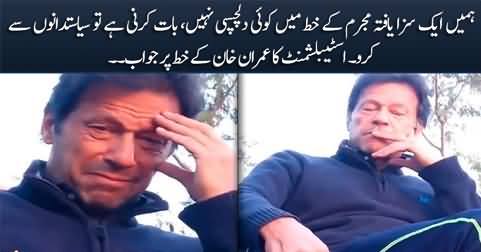 We have no interest in your letter - Establishment's reply to Imran Khan
We have no interest in your letter - Establishment's reply to Imran Khan
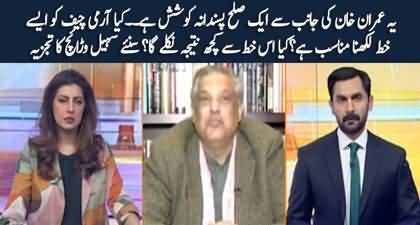 Suhail Waraich's exclusive analysis on Imran Khan's letter to Army Chief
Suhail Waraich's exclusive analysis on Imran Khan's letter to Army Chief
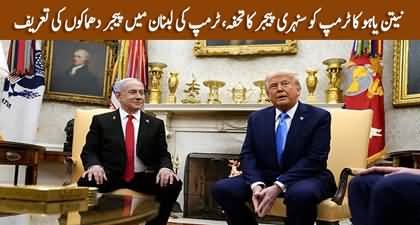 What did Trump say when Netanyahu gifted golden pager to US president?
What did Trump say when Netanyahu gifted golden pager to US president?
 Los Angeles: Police clash with protesters over Trump's mass deportations
Los Angeles: Police clash with protesters over Trump's mass deportations
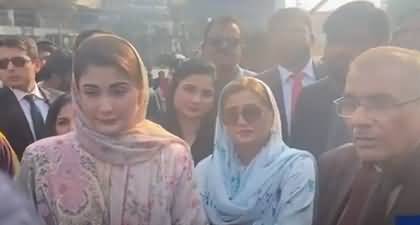 What did Maryam Nawaz say about Imran Khan's letter to COAS?
What did Maryam Nawaz say about Imran Khan's letter to COAS?
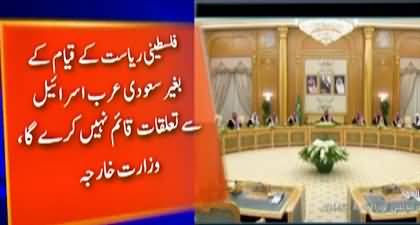 Saudi Arabia's aggressive response to Trump's claim about Saudi Arabia
Saudi Arabia's aggressive response to Trump's claim about Saudi Arabia





